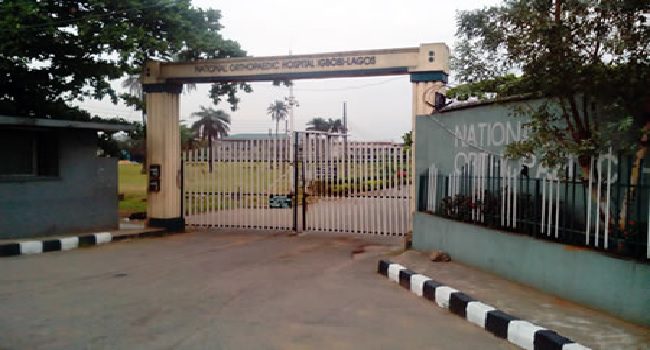Ewaoche Adah (not real name), a 57-year-old man from Ugbokpo, Apa Local Government Area of Benue State was struggling with severe Lumbar spinal stenosis (narrowing of the spinal cord). He was admitted to the Federal Medical Centre in Makurdi, where he was receiving treatment in 2018.
After a couple of weeks, Adah’s health deteriorated and he needed more medical attention, as such, he was referred to the National Orthopedic Hospital Igbobi, Lagos (NOHIL).
“We couldn’t go to Lagos immediately because we needed enough resources to take him there and it was enormous because, at that stage, he couldn’t sit on his own, which means, public transport was not an option,” Mrs. Adah told BONews.
While sharing her experience as the major caregiver to her husband, in Markurdi, and in Lagos, Mrs. Adah shared how she broke down with different ailments at the time because of the demanding emotional and physical support she needed to provide to her husband within the hospital.
“When we got to Igbobi in November 2018, we were in the hospital for over 16 weeks, we couldn’t pay for the surgery immediately and when we paid, it took a while before we were scheduled for surgery and also needed to wait for him to heal up, which took a while because of his age,” Mrs. Adah explained.
No facilities for patients’ relatives
During her stay in the hospital, Mrs. Adah was living like a fugitive; she,like other patients’ relatives, slept in the hospital walkway, regardless of the cold nights.
Adah was initially lodged in a guest house nearer to the hospital, but had a rethink when the bills were becoming unbearable.
“Other patients’ relatives had to advise me to join them in the walkway at night, as that was the alternative at the time. At some point, I almost left daddy (Mr. Adah) and returned to Benue, but there was no other person that would be there to assist him with what he would need.
“Most times, the doctors and nurses would require the attention of relatives, either for payments or for instructions about their drugs etc., if I’d left, it wouldn’t have been convenient for daddy at all,” she explained.
Left with no other option, and with the desire to care for her husband, Mrs. Adah joined other patients’ relatives, mostly women, in the walkway where they slept on cartons and used mosquito nets as a shed.
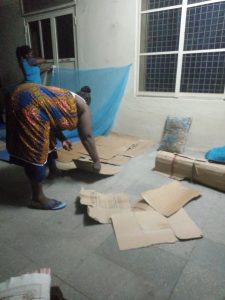
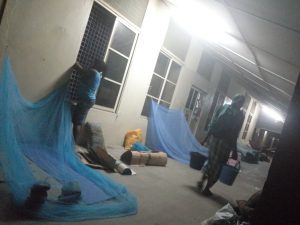
“You can’t but imagine the inconvenience and pains that we go through, but we didn’t have a choice,” Adah noted.
Like Adah, many other patients’ relatives from outside of Lagos sleep in the cold at night, while they sleep in the ‘Patient relative lounge’ in the afternoon, when they are not in the hospital ward.
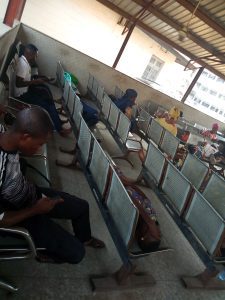
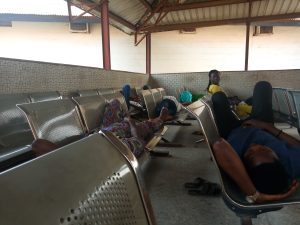
Before dawn, they fetch water and have their bath in places that are secluded within the hospital environment, while they use the public toilet facility to defecate whenever they need to.
The Narrative is still the same
Four years after Adah’s experience, the situation is still the same at NOHIL. Samuel Duru, a businessman, and resident of Lagos was billed for surgery at the hospital after an accident that caused dislocation in his right leg and a fracture in his bone.
Duru was admitted at NOHIL in September 2022, but could not bear the delay in attending to him and the unpleasant experience that his relatives encountered whenever they were around. He thereafter moved to the amenity ward within the hospital, where he got fast-tracked treatment.
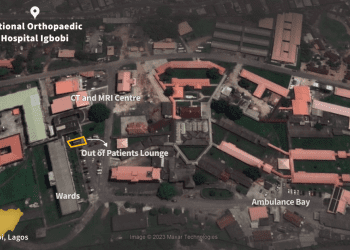
“The amenity ward is like a VIP ward within Igbobi and the price is like five times what you would pay in Igbobi, but they will attend to you immediately,” Duru told BONews.
Duru who was in Ward 8 in the amenity ward said he paid 55,000 Naira per night, apart from the surgery and treatment fee.
However, the situation was slightly different in the private ward, as he had the entire room to himself, and his caregiver and brother shared the room with him.
“There are times the doctors would book you for a test, ask you to get drugs and so many other things. So, you definitely need someone around you. Though they won’t allow many people to come in, except during the visiting hour, my brother was there with me throughout, being the main person that was interacting with the doctors,” he explained.
Sharing the importance of caregivers to patients who are admitted to the hospital, Modupe Ademola who stayed with her spouse while he was admitted at Igbobi said it is inevitable for relatives to stay with their loved ones within the hospital.
“For instance, if we need to get drugs, I have to get the prescription from the doctor, then take it to the hospital pharmacy for costing and check for availability, before I then proceed to the accounting department to pay for the drugs, after which I would go back to the pharmacy to collect the drugs.
“In all of these, I am climbing staircases, joining queues, and spending long hours getting the tasks done. Who would have assisted my husband if I wasn’t there?” Ademola asked.
Budgetary provision for the Health sector
The overall health sector budget in 2022 amended Appropriation Act was over N714 billion, cutting across personnel and overhead costs as well as capital expenditure. Recurrent expenditure was N507.18 billion and N207.38 billion for capital expenditure.
Though the breakdown for personnel was not provided in the budget document, the three National Orthopaedic hospitals across Nigeria received over N11 billion allocation on personnel costs.
The Igbobi Centre in Lagos got the highest allocation of about N5 billion allocation for overhead in 2022.
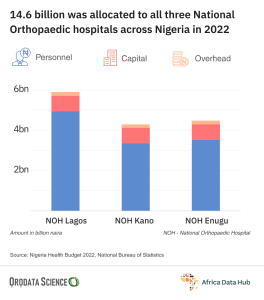
An analysis of the 2023 budget shows that N1.17 trillion was allocated to the health sector out of the total of N20.5 trillion for the 2023 fiscal year.
The amount comprises N404.08 billion for capital expenditure and N580.82 for recurrent expenditure. It also includes N2.5 billion for Aid & Grants and a provision of N62 billion for retained independent revenue which could help the health agencies execute their other activities.
Regrettably, in spite of the notable increase in the budgetary allocation to the health sector, civil society groups, focused on health, said the allocation is not sufficient to improve the health sector.
Who should assist patients?
Dr. Adeolu Olusodo, the Medical Director of Atayese Health Network, in an interview with the BONews, posited that the ideal and best practice is for hospitals to provide the necessary support and assistance to the patients, and not the responsibility of patients’ relatives as applicable in many hospitals in Nigeria.
Olusodo noted that the additional financial burden for patients and their families, as well as, the unavailability of healthcare support staff are the main reasons patients rely on their families’ assistance whenever they’re admitted to the hospitals.
“Hospitals are supposed to provide the necessary needs of patients, while the fee is incorporated into the patients’ bills. There should be an alarm that a patient can press to call for different assistance at any time.
“It could be that they need the doctor’s attention or that they need any personal thing, but that is not applicable because this is a country where many people still pay out-of-pocket for health expenses and it usually seems huge and enormous for them to bear additional expenses,” Olusodo added.
The medical expert noted that there was inadequate healthcare support staff to cater to the needs of all the patients, thereby making patients’ relatives step into the gap and provide the necessary care and support to their ailing relatives.
Dr. Eniola Cadmus, Senior Lecturer at the Department of Community Medicine, College of Medicine, University College Hospital (UCH), Ibadan, corroborated that caregivers go through a lot of stress when watching over their relatives and loved ones in the hospital.
The current systems being practiced in public hospitals in Nigeria, Dr. Cadmus said, make it difficult for patients not to require the assistance of their relatives, especially with the reality of the inadequate human personnel in the health sector.
She stressed that “in a bid to curb corruption and theft, the system makes patients go through different and tedious procedures before they could purchase drugs or get tests done in hospital facilities.”
Inadequate healthcare personnel is also another reality of why patients depend on their relatives as caregivers. “In my department, we went down from having 45 resident doctors to less than 20 within a year. This and more lead to delays in accessing healthcare services and patients’ relatives just have to be available to support their families,” Cadmus added.
Health Insurance to the rescue?
Health insurance is a type of insurance that covers medical expenses that arise due to an illness. These expenses could be related to hospitalisation costs, the cost of medicines, or doctor’s consultation fees, etc. Thus, subscribers get some or all of their medical expenses paid by an insurance company in exchange for a monthly premium payment.
However, the current economic circumstances and the culture of negligence among Nigerians have made it difficult for some citizens, who barely have enough to feed and are just trying to survive, to be uninterested in paying a premium for a health insurance policy.
With the aim of promoting Universal Health Coverage for all, Nigeria’s President Muhammadu Buhari in May 2022 signed the National Health Insurance Authority Act which repeals the National Health Insurance Scheme Act, 2004. The Act seeks to promote, regulate, and integrate health insurance schemes for all Nigerians.
If implemented, every Nigerian would be mandated to have health insurance policies, thereby eradicating the burden of out-of-pocket health care in the country.
Though existing health insurance schemes do not incorporate the cost of caregivers, Dr. Olusodo shared that if Nigerians can subscribe to health insurance schemes, they won’t be faced with the huge burden of providing health care support for their loved ones.
“I also believe that it is important that there is increased funding to the health sector so that it can be appealing to more health workers. Many health workers are travelling abroad to do these jobs, if the resources are available, they can remain in the country and the existing gaps would be addressed,” Olusodo added.
On her part, Dr. Cadmus believes that the bureaucratic bottlenecks which frustrate subscribers of the National Health Insurance Scheme (NHIS) need to be addressed, to spell out what it covers or not, with the aim of encouraging people to exit the out-of-pocket healthcare approach in Nigeria.
Cadmus noted that if the specific provisions of the scheme are not spelt out, even if people subscribe to it, it might not cater to the cost of caregivers.
The medical expert also noted that “appropriate infrastructure needs to be put in place with sufficient healthcare personnel and support staff in public hospitals across the country.”
This report is produced with support from the African Data Hub.

